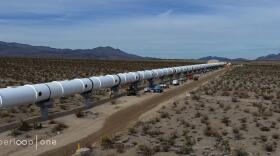For years the electric car company Tesla has tried to change the way people are allowed to buy cars in Texas. The company wants make it legal for consumers to cut out the middleman and buy cars directly from the manufacturer, a way of car shopping that’s already been adopted in many other states.
The idea is that you should be able to buy a car like you buy a computer: either retail or manufacturer direct. But when you start talking to people about this you find you’re talking about more than just consumer choice. You’re talking about jobs, you’re talking about technology and you’re talking about the future.
“I visualize in the next 10 to 20 years us driving down to South Texas and passing by trailers moving up and down our interstate with no drivers,” says state Rep Jason Isaac, Republican from Dripping Springs.
He's one of the lawmakers who has introduced a bill to open up manufacture-direct sales. His reasoning? “Maybe someone wants to set up and manufacture them here in the state of Texas?”

Isaac says that won't happen if the state holds on to the old way of doing business. Tech firms that build electric, and potentially self-driving cars, hope to sell directly to consumers.
Diarmuid O’Connell, vice president of business development at Tesla, agrees.
“I mean, we would look foolish to Wall Street, to any observer, to move to a state where we couldn’t even sell our product,” he says.
Over the last several years, the company has been successful in changing laws around vehicle sales in many states, but not Texas, where efforts have been opposed by the Texas Automobile Dealers Association.
The group has a lot of reasons it says it's a good idea to keep the status quo, the most resonant one has to do with jobs.
“Pretty much every Main Street merchant throughout the years has been replaced by big box store,” says Bill Wolters, president of the association. He believe if the bills are passed, the same will happen with car dealerships.
Beyond the arguments, the dealers also have numbers. Wolters says there are thousands of people involved in selling cars in Texas, and many of them are contacting their local lawmakers.
“The thing about it is, we have dealers in every legislative district,” he says.
“I’ve got a lot of dealers in the district I serve that are not happy with me filing this legislation,” Isaac says. “They think they’re going to [get put] out of business.”
Isaac says he hasn’t heard of dealerships shutting down in other states where the laws have been changed, and he believes the fears are unfounded. Nonetheless, he is “not optimistic” his efforts to overhaul how cars are bought and sold in Texas will be successful this year.




